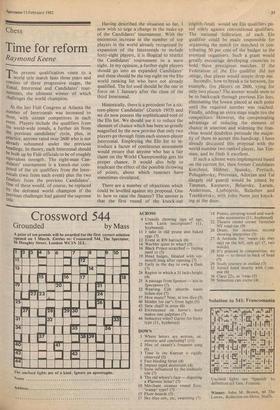Chess
Time for reform
Raymond Keene
The present qualification route to a world title match lasts three years and consists of three progressive stages, the Zonal, Interzonal and Candidates' tour- naments, the ultimate winner of which challenges the world champion.
At the last Fide Congress at Atlanta the number of Interzonals was increased to three, with sixteen competitors in each event. Players include the qualifiers from the world-wide zonals, a further six from the previous candidates' cycle, plus, in Practice, anyone rated over 2600 who is not already subsumed under the previous headings. In theory, each Interzonal should be built up by Fide officials to be of roughly equivalent strength. The eight-man Can- didates' tournament is a knock-out com- Posed of the six qualifiers from the Inter- zOnals (two from each event) plus the two finalists from the previous Candidates'. One of these would, of course, be replaced by the defeated world champion if the Previous challenger had gained the supreme title.
Having described the situation so far, I now wish to urge a change in the make-up of the Candidates' tournament. With the enormous increase in the number of top players in the world already recognised by expansion of the Interzonals to include forty-eight players, it is illogical to restrict the Candidates' tournament to a mere eight. In my opinion, a further eight players should go into an expanded Candidates' and these should be the top eight on the Elo world ranking list who have not already qualified. The list used should be the one in force on 1 January after the close of the third Interzonal.
Historically, there is a precedent for a six- teen-player Candidates' (Zurich 1953) and we do now possess the sophisticated tool of the Elo list. We should use it to reduce the element of chance which has been so greatly magnified by the new proviso that only two players go through from each sixteen-player Interzonal. Employing the Elo list to in- troduce a factor of continuous assessment would ensure that anyone who has a fair claim on the World Championship gets his proper chance. It would also help to eradicate the effect of the possible throwing of points, about which rumours have sometimes circulated.
There are a number of objections which could be levelled against my proposal. One is: how to raise the finance? The answer is that the first round of the knock-out (eighth-final) would see Elo qualifiers pit- ted solely against conventional qualifiers. The national federation of each Elo qualifier could be made responsible for organising the match (or matches) or con- tributing 50 per cent of the budget to the eventual organisers. Such a grant would greatly encourage developing countries to hold these prestigious matches. If the Federation of the Elo- qualifier did not oblige, that player would simply drop out.
Secondly, how to break a tie between, for example, five players on 2600, vying for only two places? The answer would seem to be to backtrack through previous Elo lists, eliminating the lowest placed at each point until the required number was reached. Finally, adding an extra stage might tire the competitors. However, the compensating advantage of reducing the element of chance in selection and widening the fran- chise would doubtless persuade the major- ity of them to accept this handicap. I have already discussed this proposal with the world number two ranked player, Jan Tim- man, and he finds it excellent.
If such a scheme were implemented based on the current list, then former Candidates Korchnoi, Hubner, Spassky, Portisch, Polugaievsky, Petrosian, Adorjan and Tal (largely old guard) would be joined by Timman, Kasparov, Beliaysky, Larsen, Andersson, Ljubojevic, Balashov and Tzeshkovsky, with John Nunn just knock- ing at the door.










































 Previous page
Previous page